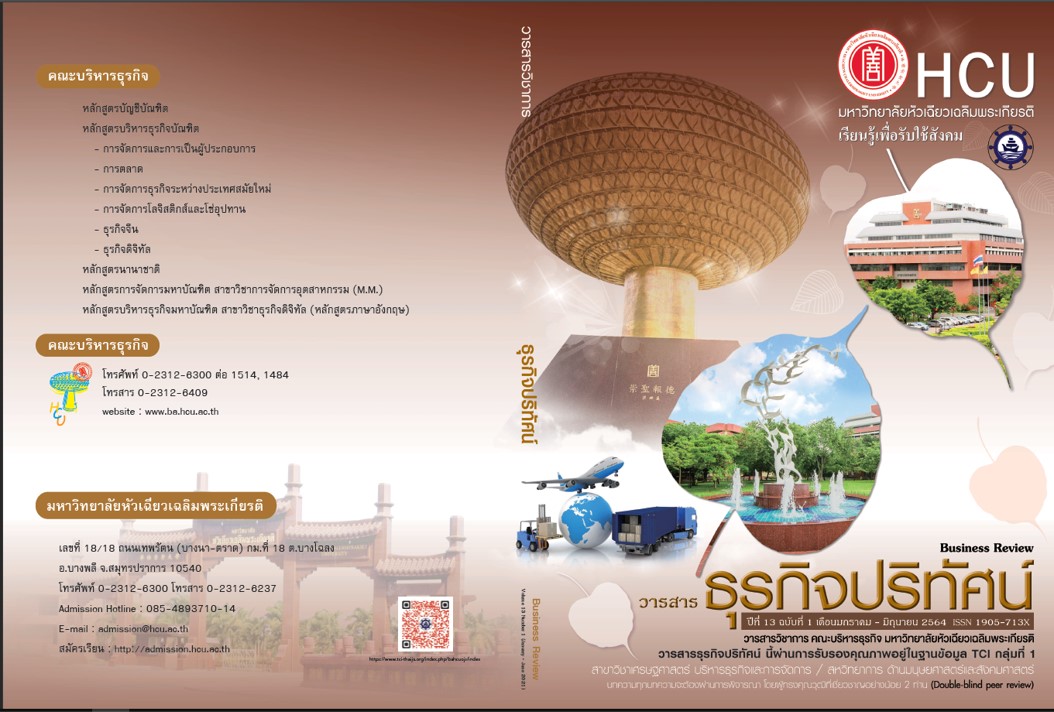Transformational leadership and Constructive Organizational Culture Towards Talent Managing Capabilities In Organization.
Transformational leadership and Constructive Organizational Culture Towards Talent Managing Capabilities In Organization
Keywords:
Transformational leadership, constructive organizational culture, Talent ManagementAbstract
A dynamic competitive environment along with the big data information technology changing cause a various type of business operation risks. The organization must adapt to the ongoing changes. One of the most adaptation is to manage the high-performance employees or also known as talent management. As a result, the talents stay with firm and highly perform their jobs according to their potential. This academic paper has two objectives: 1) is to review the concept of transformational leadership, constructive organizational culture and talent management in the organization and 2) to creative the conceptual framework of transformational leadership, constructive organizational culture and managing talents in an organization
References
ธนินทร์ รัตนโอฬาร. (2553). การพัฒนาโมเดลสมการโครงสร้างพหุระดับของภาวะผู้นาการเปลี่ยนแปลง
ของนักศึกษาปริญญาบัณฑิตสาขาวิชาบริหารธุรกิจ: การประยุกต์ใช้โมเดลการวัดเชิงก่อตัวและ
เชิงสะท้อน. วิทยานิพนธ์ปริญญาครุศาสตร์ดุษฎีบัณฑิต, จุฬาลงกรณ์มหาวิทยาลัย.
พรนพ พุกกะพันธุ์. (2554). ภาวการณ์เป็นผู้นำและการจูงใจ. กรุงเทพมหานคร: โรงพิมพ์จามจุรีโปรดักท์.
พฤกษ์ สุพรรณาลัย, และพิทักษ์ ศิริวงศ์. (2559). การจัดการคนเก่งในองค์การภาคเอกชนธุรกิจข้ามชาติ
ในประเทศไทย. วารสารจันทรเกษมสาร มหาวิทยาลัยจันทรเกษม 22(42), 31-41.
มนูญ พรรณพลีวรรณ. (2558). Talent Management Module. สืบค้นเมื่อ 9 ธันวาคม 2562, จาก http://www.ftpi.or.th/LinkClick.aspx?fileticket=ZqYGawmePUY%3D&tabid=135&mid=679
มาริสสา อินทรเกิด. (2560). การบริหารจัดการคนเก่ง ความท้าทายขององค์กร. วารสารธุรกิจปริทัศน์.
(1), 279-290.
รัตติกรณ์ จงวิศาล. (2544). ภาวะผู้นำการเปลี่ยนแปลง. วารสารสังคมศาสตร์มหาวิทยาลัยเกษตรศาสตร์.
(5): 32.
วิรัช สงวนวงศ์วาน. (2547). การจัดการและพฤติกรรมองค์กร. กรุงเทพฯ: เพียร์สัน เอ็ดดูเคชั่น
อินโดไซน่า.
วิโรจน์ สารรัตนะ. (2546). การบริหารการศึกษา : หลักการ ทฤษฎี หน้าที่ ประเด็น และบทวิเคราะห์
พิมพ์ครั้งที่ 4. กรุงเทพฯ: โรงพิมพ์ทิพย์วิสุทธิ์.
วิโรจน์ สารรัตนะ. (2557). ภาวะผู้นำ ทฤษฎี และนานาทัศนะร่วมสมัยปัจจุบัน. กรุงเทพฯ : ทิพย์วิสุทธิ์.
ศิริพงษ์ เศาภายน. (2551). ปัจจัยที่ส่งผลต่อพฤติกรรมการปฏิบัติงานของผู้บริหารสถานศึกษา. ภาควิชา
บริหารการศึกษาและอุดมศึกษา, มหาวิทยาลัยรามคำแหง.
ศุภนิจ ธรรมวงศ์. (2548). ความสัมพันธ์ระหว่างวัฒนธรรมองค์กรเชิงสร้างสรรค์ ลักษณะงาน กับ คุณภาพชีวิตการ ของพยาบาลวิชาชีพ โรงพยาบาลทั่วไปเขตภาคเหนือ. พยาบาลศาสตรมหาบัณฑิต, จุฬาลงกรณ์มหาวิทยาลัย.
สุกัญญา รัศมีธรรมโชติ. (2554). พัฒนาดาวเด่นเพื่อองค์กรที่เป็นเลิศด้วย Talent Management by
Competency-Based Career Development and Succession Planning.กรุงเทพมหานคร: บริษัท พริ้นท์ซิตี้ จำกัด.
อรุณรุ่ง เอื้ออารีสุขสกุล, และธีระวัฒน์ จันทึก. (2016). ภาวะผู้นำการเปลี่ยนแปลง:เปลี่ยนความท้าทายมุ่งสู่ความสำเร็จขององค์การอย่างยั่งยืน. ฉบับภาษาไทยสาขามนุษยศาสตร์สังคมศาสตร์และศิลปะฉบับ International Humanities, Social Sciences and arts, 9(1), 845-860.
Andrew, J. D. (1995). Leadership. New Jersey: Houghton Miffin Company.
Anuroj, K. (2014). Leadership: Tips for Successful Sustainable Development. Royal Thai Air Force Medical Gazette. 60(3): 53-56.
Berger, L. A., and Berger, D. R. (2004). The talent management handbook: Creating organizational excellence by indentifying, developing, and promoting your best people. New York: McGraw-Hill.
Burns, J. M. 1978. Leadership. New York: Harper & Row.
Cameron, K.S. and Ettington, D.R. 1988. The Conceptual Foundations of Organizational Culture. In Higher Education: Handbook of Theory and Research. 4 J.C. Smart, ed. New York: Agathon. Pp. 356-396.
Clake, R., and Winkler, V. (2006). Reflections on Talent Management’ Change agenda. London: CIPD.
Collings, D. G., and Mellahi, K. (2009). “Strategic talent management: A review and research agenda”. Human resource management review, 19(4), 304-313.
Denison, R. D. 1990. Corporate Culture and Organizational Effectiveness. Canada: John Wiley & Sons.
Downloads
Published
How to Cite
Issue
Section
License
All articles published in the Business Administration and Management Journal Review are copyrighted by the journal.
The views and opinions expressed in each article are solely those of the individual authors and do not represent those of Huachiew Chalermprakiet University or any other faculty members. Each author is fully responsible for the content of their own article. Any errors or issues found are the sole responsibility of the respective author.




